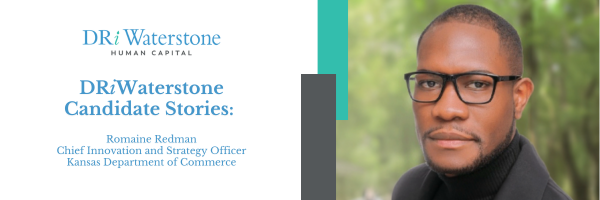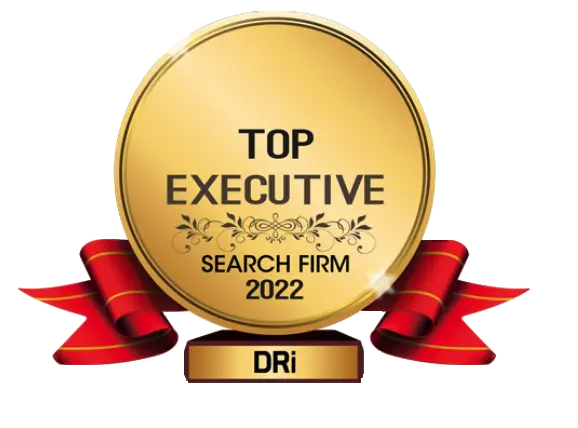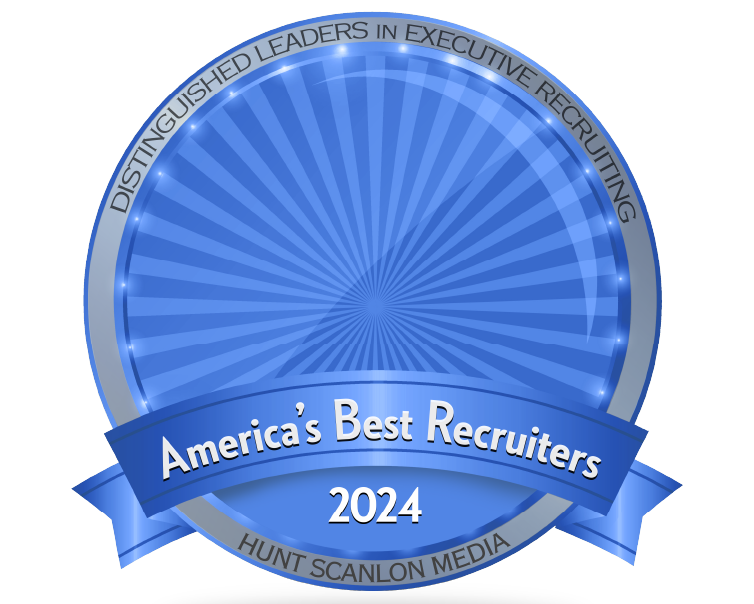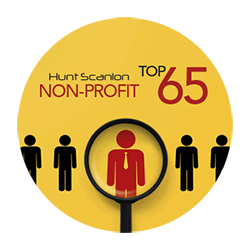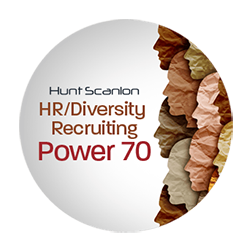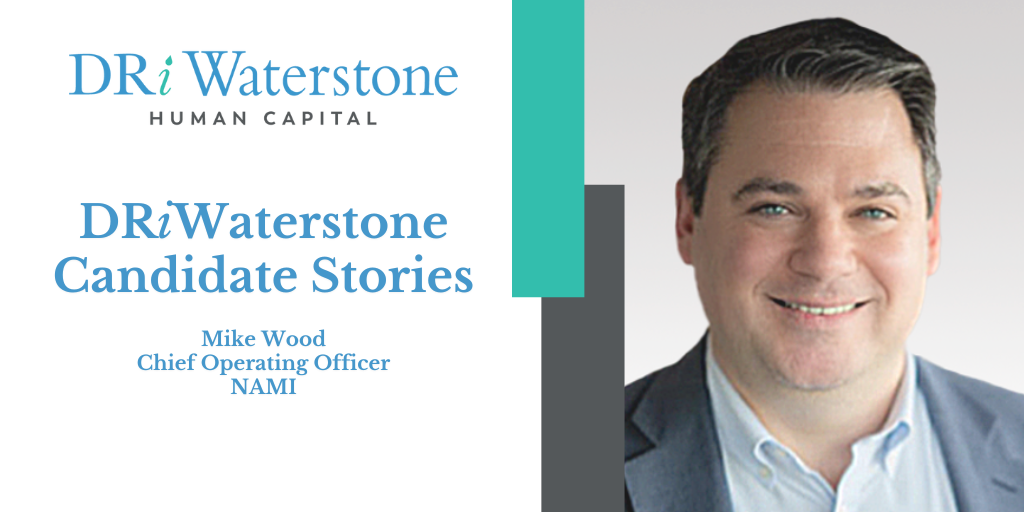
As an executive search firm specializing in the nonprofit and social impact sectors, we work hard to pair our purpose and mission-driven clients with purpose and mission-driven candidates who want to make an impact on a local, state, national, and global scale.
Earlier this year, DRiWaterstone Human Capital successfully placed Mike Wood as Chief Operating Officer at the National Alliance on Mental Illness (NAMI). We recently caught up with Mike to talk about NAMI, his role there, and his experience working with our executive search team.
—
DRiWaterstone Human Capital (DRiW): What is NAMI?
Mike Wood (MW): There is a mental health crisis in this country and it’s only getting worse; that’s why NAMI exists. We are the largest grassroots mental health advocacy organization in the country, with nearly 700 affiliates across 48 states. Our job is to make sure that people can find the mental health care that they need, that they can get help and treatment early so that their problems don’t exacerbate, and that care is affordable.
We do this through a variety means: community programs, where we’re literally meeting people where they are; we have a national helpline that provides information and referral support for people with mental health needs; and we do what I call swimming upstream – addressing the root causes of these problems through driving policy change and change in the mental healthcare delivery system. We’re also raising public awareness about mental health challenges to build support for change, and to work on the stigma that’s attached to mental health.
DRiW: What are you most excited about as you get started with NAMI?
MW: I’m excited because NAMI has been through a period of rapid growth – it has literally doubled in size over the last few years, which is great because we’re able to reach so many more people now. And I think the organization is poised to be able to expand even more – to scale its impact, to reach more families, to reach more caregivers, to reach more people with the lived experience of mental illness.
We have a strong foundation. [As Chief Operating Officer] I’m excited about helping to build even stronger internal systems and processes, and stronger accountability systems so that we can do our work even more effectively. That’s what gets me up every day. It’s why I’ve been loving every minute of this job and why I’m so grateful to be here.
This work is also deeply personal to me. I come from a family deeply impacted by mental illness. My father had mental health challenges that were untreated and he suffered from alcoholism as a result that led to a substantial amount of verbal and physical abuse in my home growing up. My mother had undiagnosed bipolar disorder for years before figuring it out, and also suffered from substance abuse disorder. She never got the quality treatment she really needed and died from an accidental overdose when she was only 57 years old. My oldest brother also had untreated mental health challenges and substance abuse disorder and died from an accidental overdose 15 months after my mother. He was 35 years old and left a wife and 12-year-old son at home. So, I have lived this challenge, and I know the impact a poor mental healthcare system has on people and their families. It’s devastating. We have to do better as a country, and I know we can.
DRiW: Talk about your experience working with DRiWaterstone and what stood out to you during the hiring process.
MW: I have worked with a lot of recruiting firms over the years through a lot of different recruiting processes, and so I’ve seen it all. I was really, really impressed with the work that DRiWaterstone did. The process was collaborative, and the conversations I had were candid and really helpful. I felt supported throughout the entire process.
DRiWaterstone did a great job in helping me understand the organization that that I was interviewing for, which often isn’t the case when you work with recruiting firms. The people I worked with had a deep knowledge of the organization and the context around the hire, which was helpful to me in preparing for my interviews. I always ask when I when I go through these processes, “So tell me about what they’re looking for.” A lot of times you get really vague answers and that’s not helpful. But [the DRiWaterstone team] knew the client, knew the organization. I felt incredibly prepared.
It was just a great process from beginning to end, and it’s not something you see all the time working with recruiting firms.
DRiW: Was there something specific that DRiWaterstone did during the process that gave you confidence in in working with the team?
MW: I knew from our first conversation that what they were looking for really matched up with my skills and experiences. It was not vague. I’ve been through these processes before where you think, based on a relatively vague conversation, that you might be a good fit and you get into the first interview and you wonder, why did they put me in front of these people? This was not that.
It also gave me confidence that [the DRiWaterstone team] were checking in with me throughout the entire process. It wasn’t every day, but it was almost every day. You don’t see that in all recruiting firms. They were helping me put my best foot forward.
DRiW: You’ve worked at a number of different not for profits throughout your career. What is it about the industry that you like and that keeps you working there?
MW: I’ve worked in the nonprofit sector for almost 25 years now and I stay in this sector because I think it is uniquely positioned to help bridge the divides in this country, to bring people together across dividing lines, and to elevate their shared aspirations so we can act together in a way that moves us forward collectively.
I think because of the nonprofit sector’s nonpartisan status, we are uniquely positioned to bring people together to get things done that move us forward as a society. We don’t get involved in electioneering, we focus on the issues, we work with anyone of any political stripe on the issues that we care about to get things done. We care about the issues and the problems we’re trying to solve. That’s what I love about it.
I love also love being around people who are just really, passionately committed to making people’s lives better. Every day that you go to work in the nonprofit sector, you’re surrounded by people who could all be doing other work in other places and making a lot more money relative to their job. But they’re in this work because they believe that the world can be a better place. They believe that they have an obligation to put more good in the world and to give more than they take.
I wish we lived in a world where the nonprofit sector didn’t need to exist. I wish we lived in a world where NAMI didn’t need to exist. That’s really the dream of every person that works in a nonprofit sector – to build a world where our jobs don’t exist anymore because they’re not needed.
DRiW: What’s next for NAMI?
MW: NAMI is in the process of rolling out a new five year strategic plan that will get us to our 50th anniversary in 2029. It’s an ambitious plan that I think will allow us to capitalize on the growth we’ve experienced in the last few years. It’s all focused around a bold vision for people: to prioritize mental health, to help people get help early, and to actually get the best possible care available. It lays out four strategic priorities for the organization:
- Strengthening our alliance so that our state organizations and our affiliates can achieve their full potential.
- Turbocharging our impact through awareness building and advocacy to address stigma and some of those root causes to the mental health crisis.
- Driving excellence across our programs and initiatives to meet evolving demand so people are taking in training and information in new and different ways. As technology use in our culture has evolved, we want to continue to evolve our programs so they can be delivered in new ways, using technology asynchronously so that people can actually get the content and knowledge they need.
- Evolving NAMI into an even more effective and efficient national organization. Over the next few years, we’re going to be working on catching up to our growth, strengthening our internal systems and processes, building new capabilities so that we can streamline some of our work and do it more effectively.
We’re doing all of that work so that we know we’re leveraging the dollars we’re getting as effectively as possible and we’re reaching as many people as we possibly can and improving their lives.
—
At DRiWaterstone, we have the pleasure to work with some of the best purpose and mission-driven clients and candidates in the nonprofit and social impact space. To learn more about how we can help you build your high-performance teams and drive growth, email us – we’d love to talk!

